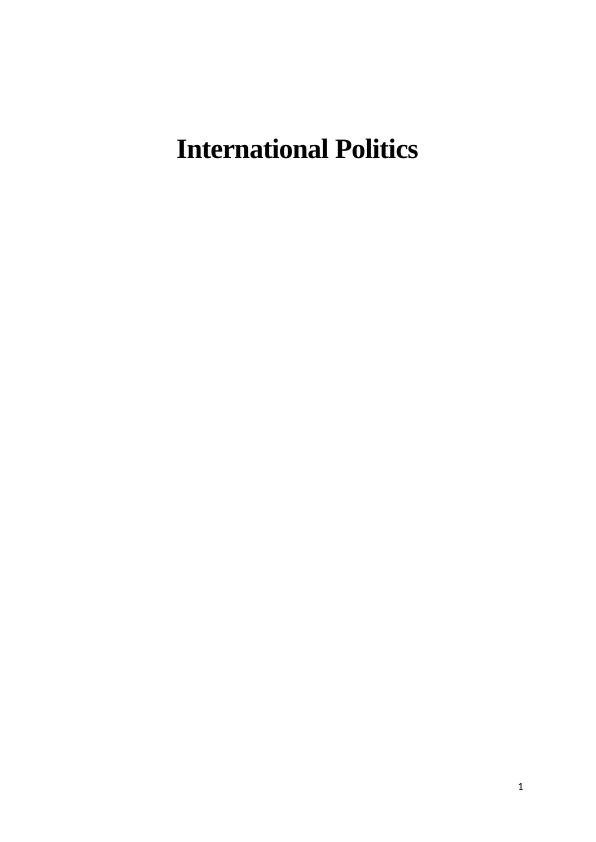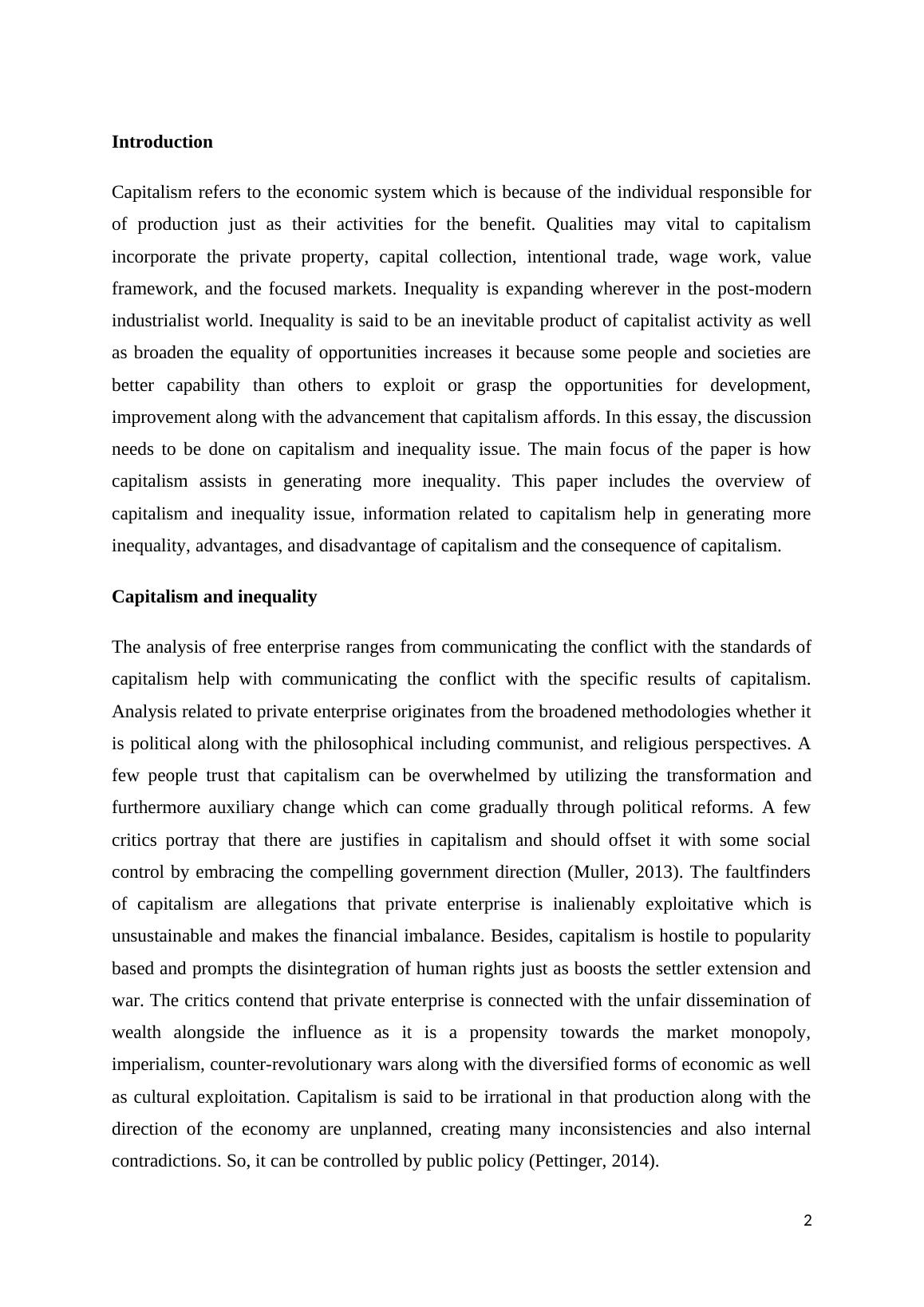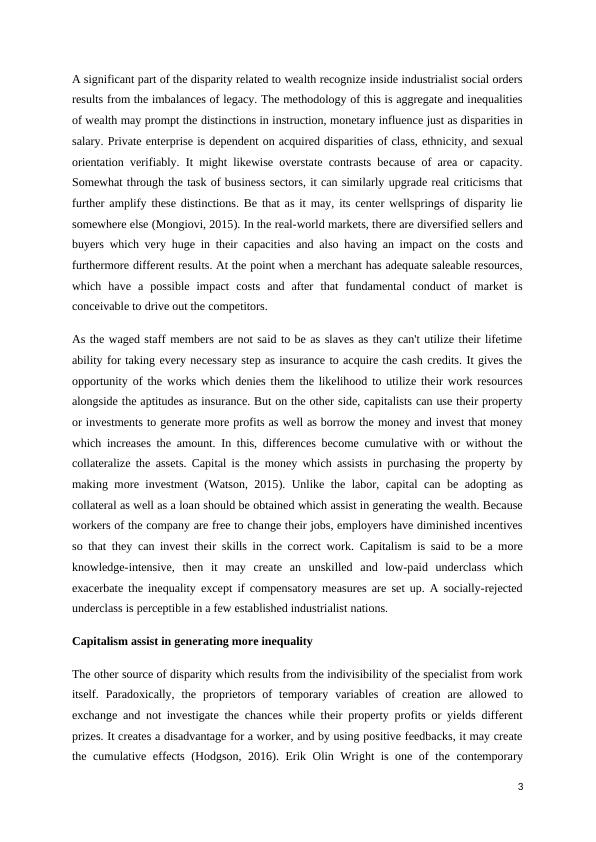Ask a question from expert
Capitalism and Inequality: How Capitalism Generates More Inequality
10 Pages3106 Words437 Views
Added on 2019-10-18
About This Document
This essay discusses the issue of capitalism and inequality. It covers the sources of disparity, how capitalism generates more inequality, advantages and disadvantages of capitalism, and the consequences of capitalism. The essay also includes the perspectives of political thinkers such as Marx and Weber on the issue of inequality.
Capitalism and Inequality: How Capitalism Generates More Inequality
Added on 2019-10-18
BookmarkShareRelated Documents
International Politics1

IntroductionCapitalism refers to the economic system which is because of the individual responsible forof production just as their activities for the benefit. Qualities may vital to capitalismincorporate the private property, capital collection, intentional trade, wage work, valueframework, and the focused markets. Inequality is expanding wherever in the post-modernindustrialist world. Inequality is said to be an inevitable product of capitalist activity as wellas broaden the equality of opportunities increases it because some people and societies arebetter capability than others to exploit or grasp the opportunities for development,improvement along with the advancement that capitalism affords. In this essay, the discussionneeds to be done on capitalism and inequality issue. The main focus of the paper is howcapitalism assists in generating more inequality. This paper includes the overview ofcapitalism and inequality issue, information related to capitalism help in generating moreinequality, advantages, and disadvantage of capitalism and the consequence of capitalism.Capitalism and inequalityThe analysis of free enterprise ranges from communicating the conflict with the standards ofcapitalism help with communicating the conflict with the specific results of capitalism.Analysis related to private enterprise originates from the broadened methodologies whether itis political along with the philosophical including communist, and religious perspectives. Afew people trust that capitalism can be overwhelmed by utilizing the transformation andfurthermore auxiliary change which can come gradually through political reforms. A fewcritics portray that there are justifies in capitalism and should offset it with some socialcontrol by embracing the compelling government direction (Muller, 2013). The faultfindersof capitalism are allegations that private enterprise is inalienably exploitative which isunsustainable and makes the financial imbalance. Besides, capitalism is hostile to popularitybased and prompts the disintegration of human rights just as boosts the settler extension andwar. The critics contend that private enterprise is connected with the unfair dissemination ofwealth alongside the influence as it is a propensity towards the market monopoly,imperialism, counter-revolutionary wars along with the diversified forms of economic as wellas cultural exploitation. Capitalism is said to be irrational in that production along with thedirection of the economy are unplanned, creating many inconsistencies and also internalcontradictions. So, it can be controlled by public policy (Pettinger, 2014). 2

A significant part of the disparity related to wealth recognize inside industrialist social ordersresults from the imbalances of legacy. The methodology of this is aggregate and inequalitiesof wealth may prompt the distinctions in instruction, monetary influence just as disparities insalary. Private enterprise is dependent on acquired disparities of class, ethnicity, and sexualorientation verifiably. It might likewise overstate contrasts because of area or capacity.Somewhat through the task of business sectors, it can similarly upgrade real criticisms thatfurther amplify these distinctions. Be that as it may, its center wellsprings of disparity liesomewhere else (Mongiovi, 2015). In the real-world markets, there are diversified sellers andbuyers which very huge in their capacities and also having an impact on the costs andfurthermore different results. At the point when a merchant has adequate saleable resources,which have a possible impact costs and after that fundamental conduct of market isconceivable to drive out the competitors.As the waged staff members are not said to be as slaves as they can't utilize their lifetimeability for taking every necessary step as insurance to acquire the cash credits. It gives theopportunity of the works which denies them the likelihood to utilize their work resourcesalongside the aptitudes as insurance. But on the other side, capitalists can use their propertyor investments to generate more profits as well as borrow the money and invest that moneywhich increases the amount. In this, differences become cumulative with or without thecollateralize the assets. Capital is the money which assists in purchasing the property bymaking more investment (Watson, 2015). Unlike the labor, capital can be adopting ascollateral as well as a loan should be obtained which assist in generating the wealth. Becauseworkers of the company are free to change their jobs, employers have diminished incentivesso that they can invest their skills in the correct work. Capitalism is said to be a moreknowledge-intensive, then it may create an unskilled and low-paid underclass whichexacerbate the inequality except if compensatory measures are set up. A socially-rejectedunderclass is perceptible in a few established industrialist nations. Capitalism assist in generating more inequalityThe other source of disparity which results from the indivisibility of the specialist from workitself. Paradoxically, the proprietors of temporary variables of creation are allowed toexchange and not investigate the chances while their property profits or yields differentprizes. It creates a disadvantage for a worker, and by using positive feedbacks, it may createthe cumulative effects (Hodgson, 2016). Erik Olin Wright is one of the contemporary3

End of preview
Want to access all the pages? Upload your documents or become a member.
Related Documents
Relation between capitalism and inequalitylg...
|7
|2027
|40